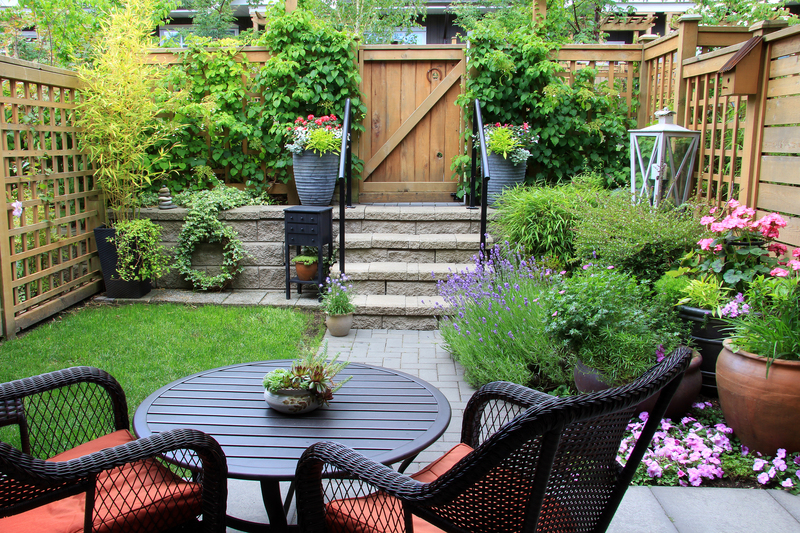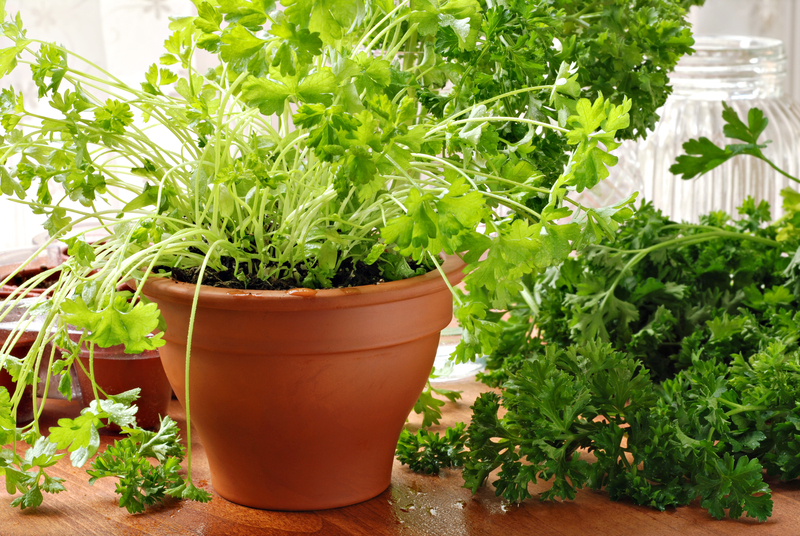Unearth the secrets of gardening that aid in climate stabilization
Posted on 31/08/2025
Unearth the Secrets of Gardening That Aid in Climate Stabilization
Are you looking for ways to make your garden not just beautiful but also environmentally impactful? It's time to unearth the secrets of gardening that aid in climate stabilization. By adopting climate-friendly gardening practices, you can reduce your carbon footprint, improve biodiversity, and even combat global warming--right from your backyard!
Why Gardening Matters for Climate Stabilization
Healthy gardens do so much more than please the eye. They act as miniature ecosystems, contributing to the overall health of our planet. Thoughtful gardening can:
- Sequester carbon from the atmosphere
- Enhance soil health and biodiversity
- Reduce urban heat and create microclimates
- Promote water retention and lower runoff
- Provide habitats for pollinators and wildlife
By following a few crucial gardening secrets, you can turn your patch of earth into an active force for climate stabilization.

Soil Health: The Cornerstone of Climate-Smart Gardens
The Power of Carbon Sequestration
One of the most profound secrets to gardening for climate stabilization lies below our feet--the soil. Healthy soils absorb and hold carbon, keeping it out of the atmosphere. This process, known as carbon sequestration, transforms your garden into a vital player in tackling excess greenhouse gases.
Building Organic Matter
To maximize your garden's carbon-capturing potential:
- Mulch regularly with organic materials like compost, straw, or wood chips to add nutrients and lock in moisture.
- Compost kitchen scraps and green waste, returning essential nutrients to the soil and reducing landfill use.
- Avoid tilling, as it disturbs soil microbes and releases stored carbon.
- Plant cover crops such as clover, vetch, or rye during off-seasons to protect and enrich the soil.
Native and Drought-Resistant Plants: Gardening for Climate Resilience
The Advantages of Native Species
Adopting native plants is a climate-smart gardening secret. These species are adapted to your local environment, requiring less water, fertilizer, and maintenance. They also support native pollinators, birds, and insects, strengthening biodiversity, which is crucial for a stable climate.
Drought-Tolerant Choices
With rising temperatures and unpredictable rainfall, selecting drought-tolerant plants is essential. These resilient varieties require less irrigation, helping conserve water--a precious resource in the face of climate change.
- Succulents and cacti
- Lavender, sage, and yarrow for pollinator-friendly beauty
- Ornamental grasses for soil stabilization
By thoughtfully selecting your garden's plant palette, you're directly contributing to landscape resilience and climate stabilization.
Water-Wise Gardening: Conserving Every Drop
Rainwater Harvesting
Harnessing rainwater is a powerful way to garden sustainably. Install rain barrels or create rain gardens to capture runoff, reducing the strain on municipal water sources and preventing soil erosion.
Efficient Irrigation Techniques
Upgrade your watering methods to minimize waste:
- Drip irrigation delivers water directly to plant roots, preventing evaporation.
- Water early in the morning or late in the evening for maximum absorption.
- Group plants with similar water needs together to prevent overwatering.
By optimizing water use, your garden thrives while preserving critical resources and supporting climate regulation.
Composting: Turning Waste into Climate Gold
Reduce, Recycle, Restore
Composting is a time-tested gardening secret with profound climate benefits. Food scraps and yard waste, when composted, break down into rich humus, replenishing the soil and reducing methane emissions generated in landfills.
- Compostable materials include vegetable peels, coffee grounds, eggshells, grass clippings, and leaves.
- Avoid adding meat, dairy, or oil to your compost, as these attract pests and slow decomposition.
- Layer "greens" (nitrogen-rich) and "browns" (carbon-rich) for balanced decomposition.
- Turn your compost pile every few weeks to aerate and speed up the process.
By creating and using your own compost, you lessen chemical fertilizer reliance and enrich your soil--both keys to gardening that stabilizes climate.
Garden Design for Carbon and Biodiversity
Plant Trees and Shrubs
Trees and shrubs are natural carbon sinks. Even small urban gardens can accommodate dwarf fruit trees, berry bushes, or hedgerows. These plants:
- Store carbon as they grow
- Provide shade, reducing home energy use
- Offer shelter for birds and insects
Layered Planting Strategies
Forest gardening is a method where multiple layers of plants--from ground covers to tall trees--mimic a natural forest ecosystem. This approach:
- Maximizes space and yields
- Improves soil structure and water retention
- Boosts biodiversity and strengthens climate resistance
Reducing Lawn Space: A Secret to Eco-Friendly Gardening
Traditional lawns demand water, fertilizers, and frequent mowing (which often uses fossil fuels). By reducing your lawn area and replacing grass with native wildflowers, ground covers, or edible plants, you create a garden that supports climate stabilization and wildlife.
Benefits of Lawn Alternatives
- Less irrigation needed
- No chemical fertilizers or pesticides
- Increased habitat for pollinators and beneficial insects
- Reduced greenhouse gas emissions from mowers and blowers
Organic Gardening: Shrinking the Carbon Footprint
Avoiding Synthetic Chemicals
Chemical fertilizers and pesticides can harm beneficial soil organisms, runoff into waterways, and are carbon-intensive to produce. Organic gardening practices rely on natural amendments and biological pest control, making them integral to gardening for climate stabilization.
- Use neem oil, insecticidal soap, or companion planting for pest management
- Add organic compost and mulch to feed the soil
- Encourage natural predators of garden pests, such as ladybugs and birds
Encouraging Pollinators and Biodiversity
Why Pollinators Matter
A biodiverse garden full of pollinators like bees, butterflies, and birds is more than just delightful--it's essential for a resilient ecosystem. Healthy biodiversity means healthier plants, more food, and improved soil--a win-win for climate stability.
- Plant a variety of native flowers that bloom from spring to fall
- Avoid pesticides that harm pollinators
- Provide water sources, like shallow dishes with pebbles for bees
- Leave some "messy" areas--brush piles or dead wood--for habitat
Urban Gardening and Climate Stabilization
Greening Cities for a Cooler Planet
Urban areas generate significant heat and pollution. Rooftop gardens, vertical gardens, and community plots not only add green space, but also:
- Lower city temperatures by providing shade and evaporative cooling
- Filter air pollutants
- Grow food locally, reducing transportation emissions
- Improve mental well-being and community resilience
Whether you're in a high-rise or have a patio, incorporating green elements brings climate benefits right to your door.
Gardening for Climate Stabilization: Tips for Getting Started
- Assess your site: Observe sun, shade, soil, and water access to select the right plants.
- Choose native and climate-resilient plants for lasting impact.
- Start composting to close the nutrient loop and build healthy soil.
- Reduce lawn size; diversify your landscape with edible or flowering perennials.
- Install rainwater harvesting systems to irrigate your garden naturally.
- Share seeds, cuttings, and ideas with neighbors to multiply your impact!
The Global Impact of Climate-Friendly Gardening
Imagine the power of millions of gardeners worldwide implementing these secrets. Together, we could:
- Reverse the trend of soil degradation
- Restore pollinator populations
- Reduce urban temperatures and air pollution
- Lock away tons of carbon dioxide, all while enjoying lush, captivating landscapes
Gardening as a Climate Solution: Your Backyard Counts!
Every sustainable gardening action counts in the fight for climate stabilization. From compost bins to native wildflowers and shaded trees, adopting these gardening secrets on any scale means you're nurturing a healthier planet. Be inspired to unearth the secrets of gardening that aid in climate stabilization--let your garden bloom for the earth!

Frequently Asked Questions About Gardening for Climate
Q: How does gardening help stabilize the climate?
A: Gardening stabilizes the climate primarily by absorbing carbon dioxide, enhancing biodiversity, conserving water, and reducing the need for fossil-fuel intensive inputs.
Q: What are some simple changes I can make for a more climate-resilient garden?
A: Start by composting, reducing lawn space, using native plants, mulching, and installing rain barrels. Every little action adds up!
Q: Are my gardening choices really that impactful?
A: Absolutely! Collectively, gardeners have enormous potential to restore balance in local ecosystems and play a role in global climate stabilization.
Conclusion: Dig In for a Sustainable Future
Don't underestimate the power hiding in your humble plot of earth. By uncovering and embracing these gardening secrets for climate stabilization, you nurture both your outdoor space and the planet itself. Whether you choose to compost, plant a tree, or simply water wisely, each effort roots us closer to a stable, healthy future. So, grab your trowel and dig in--the earth is counting on you!
Latest Posts
Transform Your Space with 5 Cost-Effective Low Maintenance Garden Tips
Creating a Dog-Friendly Oasis in Your Garden
Transform Your Outdoor Area with Serene Zen Garden Ideas

